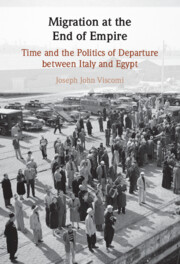Book contents
- Migration at the End of Empire
- Migration at the End of Empire
- Copyright page
- Contents
- Figures
- Tables
- Acknowledgements
- Introduction
- 1 Extraterritoriality and Migrant Diplomacy in Egypt, 1861–1937
- 2 Isolating Time
- 3 Twice without a King
- 4 Becoming Refugees, 1954–1960s
- 5 ‘Leave Us Our Memories!’ Nostalgia, Community, and the Politics of Departure
- Epilogue
- Bibliography
- Index
1 - Extraterritoriality and Migrant Diplomacy in Egypt, 1861–1937
Published online by Cambridge University Press: 30 May 2024
- Migration at the End of Empire
- Migration at the End of Empire
- Copyright page
- Contents
- Figures
- Tables
- Acknowledgements
- Introduction
- 1 Extraterritoriality and Migrant Diplomacy in Egypt, 1861–1937
- 2 Isolating Time
- 3 Twice without a King
- 4 Becoming Refugees, 1954–1960s
- 5 ‘Leave Us Our Memories!’ Nostalgia, Community, and the Politics of Departure
- Epilogue
- Bibliography
- Index
Summary
This chapter shows how extraterritorial jurisdiction facilitated the coexistence of nationalist and imperialist projects in colonial Egypt. The safeguards proffered by Ottoman-era extraterritoriality had been either adapted to European colonial administrations or cancelled by the early twentieth century. In Egypt, they remained in effect until 1937, playing a formative role when Mussolini announced an aggressively imperialistic project in the Mediterranean in 1933. Cultural institutions, state schools, and Italian consulates became crucial sites of encounter and propaganda dissemination for the regime. Rome’s focus on building a national community coincided with a steady rise in unemployment among Italian subjects. Italians in Egypt became dependent upon Italian state structures just as the they became vital to Rome’s propaganda in the region. Notwithstanding the efforts of the fascist government to convince Egyptian nationalists that Italy’s imperial ambitions posed no territorial threat, the 1936 Anglo-Egyptian Treaty set the stage for the end of extraterritoriality and discourse around ’repatriation’ emerged to mitigate tensions between nationalist and imperialist projects.
- Type
- Chapter
- Information
- Migration at the End of EmpireTime and the Politics of Departure Between Italy and Egypt, pp. 33 - 82Publisher: Cambridge University PressPrint publication year: 2024

